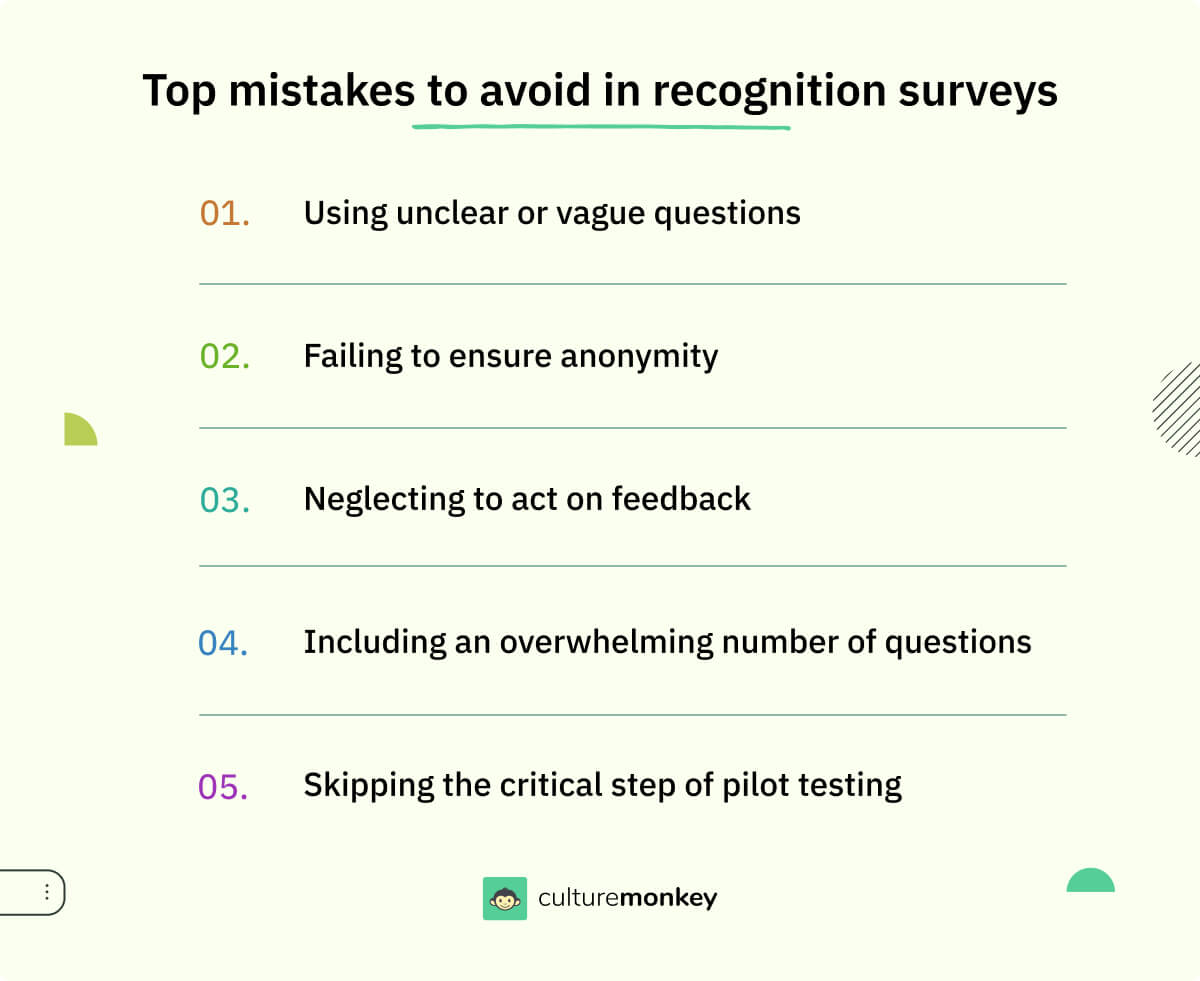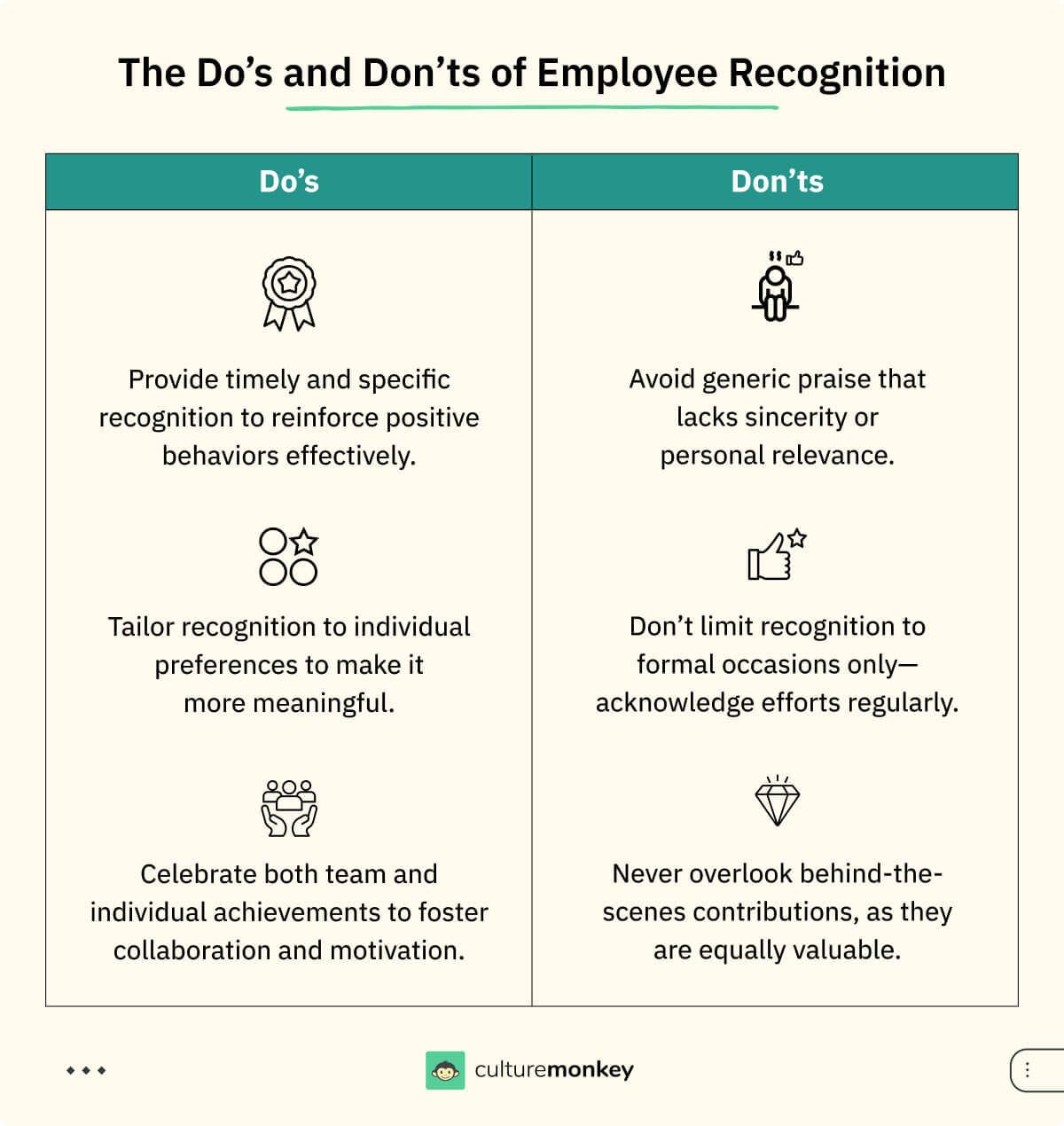55+ Employee recognition survey questions that you should ask your employees in 2025

Imagine a sports team celebrating a championship win. The star player gets a lot of attention, but the coach makes sure to highlight the defenders, bench players, and even the equipment staff whose behind-the-scenes efforts were crucial.
This acknowledgment keeps the entire team motivated, knowing their contributions matter just as much as the big plays. The workplace is no different. Everyone’s effort deserves recognition to keep morale high and engagement strong.
Employee recognition survey questions help organizations uncover how to make every employee feel valued, ensuring the whole team stays inspired. Let’s explore how to create these questions effectively.
Blog Highlights

What is employee recognition?

Employee recognition is the acknowledgment and appreciation of an employee's efforts, achievements, or contributions. It fosters a sense of value, boosting morale and engagement. Effective recognition is timely, specific, and aligned with organizational values, ensuring it highlights behaviors that support company goals.
It should also be inclusive, celebrating employees at all levels, and diverse in approach—ranging from verbal praise to professional growth opportunities. Peer-to-peer recognition adds a collaborative dimension, strengthening team dynamics.
When done consistently, employee recognition builds trust and loyalty, creating a culture where employees feel seen and motivated. This ultimately leads to increased satisfaction, better retention, and enhanced organizational performance.



My answer to people who ask, ‘should we just thank people for doing their jobs?’: Absolutely, yes, you should. Because every leader's job is to coach their people. You say thank you to people for doing something that you want them to do, and guess what? They'll repeat it.
Founder + CEO
Brené Brown Education and Research Group
How do you ask an employee about recognition?
Understanding employees' experiences with recognition is vital for fostering a culture of appreciation and engagement. Surveys provide a structured and effective way to gather these insights. Here are some key benefits of using surveys for employee recognition feedback:
- Standardized feedback: Surveys ensure consistency in gathering responses, making it easier to analyze data from a large group while ensuring every employee's voice is represented.
- Anonymity encourages honesty: Anonymous surveys allow employees to share their true thoughts without fear of bias or repercussions, leading to more authentic and actionable feedback.
- Comprehensive question design: Surveys accommodate a mix of quantitative and qualitative questions, exploring recognition’s frequency, type, fairness, and effectiveness.
- Convenient accessibility: Digital surveys enable employees to respond at their own pace, increasing participation and engagement across diverse teams.
- Actionable insights: Combining numerical data with detailed feedback provides organizations with a holistic view, paving the way for meaningful improvements in recognition practices.
What is recognition questionnaire?

A recognition questionnaire is a structured tool designed to gather feedback from employees regarding their experiences, perceptions, and preferences related to recognition practices within an organization.
Typically administered in the form of a survey, the questionnaire comprises a series of questions aimed at assessing various aspects of recognition, such as frequency, type, effectiveness, and fairness.
Questions may cover topics such as the frequency of recognition received, the types of recognition preferred, satisfaction levels with existing programs, and suggestions for improvement.
By utilizing a recognition questionnaire, organizations can gain valuable insights into the effectiveness of their recognition efforts, identify areas for enhancement, and tailor recognition programs to better align with employees' needs and preferences.
This structured approach ensures that feedback is systematically collected, analyzed, and acted upon to foster a culture of appreciation and recognition within the workplace.
Importance of employee recognition survey
Employee recognition surveys are essential tools for organizations aiming to enhance workplace culture and boost employee satisfaction. By systematically gathering feedback on recognition practices, these surveys provide valuable insights that inform strategic decisions.
IBM’s WorkTrends study showed intention to quit is twice as high among employees who do not receive recognition (51%) compared to those who do (25%)
- Identifying gaps in recognition programs: Surveys reveal discrepancies between current recognition efforts and employee expectations, enabling organizations to address shortcomings and tailor programs to meet diverse needs.
- Enhancing employee engagement: Regular feedback collection through surveys demonstrates a commitment to valuing employee input, fostering a sense of belonging and increasing overall engagement levels.
- Informing leadership development: Insights from surveys highlight areas where managerial recognition practices may need improvement, guiding targeted leadership training and development initiatives.
- Measuring program effectiveness: Surveys serve as benchmarks to assess the impact of recognition programs over time, allowing for data-driven adjustments to enhance their effectiveness.
- Promoting a culture of continuous improvement: By regularly soliciting feedback, organizations cultivate an environment that values continuous improvement, encouraging employees to contribute ideas for enhancing recognition practices.
Benefits of employee recognition surveys

Recognition is key in encouraging employees to work hard and remain motivated. It creates a feeling of security and appreciation for their efforts which is especially important during times of growth or change within the organization.
It helps to build a sense of pride in their value to the company and reinforces the idea that their contributions are appreciated and valued.
This can be done in many different ways, from rewards and bonuses to verbal praise and recognition. Regardless of the method, it is important to recognize and reward employees for their hard work, as it increases job satisfaction and loyalty.
Here are some benefits of conducting employee engagement survey in the workplace.
Identifies areas for improvement
Employee engagement survey questions provide valuable insight into how employees perceive their work environment, their relationships with their colleagues, and the rewards they receive for their hard work.
By understanding the level of recognition employees are receiving and where they feel they are not being properly recognized, employers can take steps to ensure their employees feel valued and appreciated.
Increases employee engagement
Employee engagement surveys allow organizations to measure employee satisfaction and uncover any issues that may be preventing employees from being productive and happy.
They also provide insight into what motivates and inspires employees, enabling organizations to create a more engaging work environment.
By understanding employee needs and opinions, organizations can increase employee retention, engagement, and ensure their employees are truly engaged in their work.
Enhances employee morale and productivity
Employee engagement surveys help employee morale and productivity by understanding employee needs and wants; employers can create a workplace environment that encourages engaged employees.
The surveys also help employers identify potential areas of improvement and create solutions that increase employee satisfaction, and productivity.
Ultimately, employers can create a more positive workplace atmosphere and a more productive workforce by measuring employee engagement and sentiment.

Acknowledges recognition practices that work.
Surveys help to identify which acknowledgment and recognition practices are working and which need to be improved. They also provide insight into how employees feel recognized about the recognition they receive and how they feel valued as employees.
Promotes a culture of appreciation
They provide an opportunity for employers to understand the needs of their employees and to be able to recognize and reward individual and team accomplishments.
Surveys also allow employees to express their opinions and suggestions to improve the workplace. Employers can foster a more engaged and committed workforce by creating a company culture of appreciation and gratitude by working with their employees’ suggestions.
Improves communication
Through surveys, managers can gain insight into their employees' understanding of the company values and goals, as well as their feelings about their job and overall satisfaction.
This feedback can help managers identify areas for improvement in how they communicate with employees and help create an environment of trust and collaboration.
Encourages continuous feedback and improvement
Employee recognition surveys facilitate ongoing feedback loops between employees and employers.
By regularly soliciting feedback, organizations can identify trends and areas for improvement, leading to continuous enhancement of recognition practices and overall employee satisfaction.
Strengthens team cohesion and collaboration
Through recognition surveys, organizations can gauge how well teams are working together and how effectively they are acknowledging each other's contributions.
By fostering a culture of recognition and appreciation, teams can become more cohesive, collaborative, and supportive of one another, leading to improved productivity and morale.
Empowers employees and increases autonomy
Surveys empower employees by giving them a voice in shaping their work environment and recognition practices. When employees feel heard and valued, they are more likely to take ownership of their work and contribute to the organization's success.
Providing autonomy in how recognition is given can further enhance employee engagement and satisfaction.
Drives innovation and creativity
Employee recognition surveys can uncover insights into employees' ideas, innovations, and areas where they feel their creativity is recognized and valued.
By acknowledging and rewarding creative contributions, organizations can foster a culture of innovation and encourage employees to think outside the box, leading to improved problem-solving and business outcomes.
Strengthens employer branding and reputation
An effective employee recognition program, supported by regular surveys, can enhance an organization's employer branding and reputation. When employees feel appreciated and valued, they are more likely to speak positively about their employer, both internally and externally.
This positive word-of-mouth can attract top talent and enhance the organization's reputation as an employer of choice within the industry.
Fosters leadership accountability
Employee recognition surveys provide leaders with clear data on how effectively they are recognizing their teams.
This transparency helps hold leadership accountable for implementing meaningful recognition practices and encourages a leadership style rooted in appreciation and trust.
Facilitates personalized recognition
Surveys allow organizations to gather individual preferences for recognition, whether employees value public acknowledgment, private praise, or tangible rewards.
This personalization ensures that recognition efforts resonate with employees on a deeper level, making them feel genuinely valued and boosting engagement and loyalty.
Employee recognition surveys vs employee engagement surveys
| Aspect | Employee recognition surveys | Employee engagement surveys |
|---|---|---|
| Scope and focus | Focuses specifically on how employees perceive recognition efforts, including frequency, type, and impact. | Encompasses broader workplace factors such as satisfaction, alignment with values, career growth, and relationships. |
| Primary objective | Evaluates and enhances recognition programs to meet employee expectations and motivate them effectively. | Measures overall employee commitment and enthusiasm to improve engagement and retention. |
| Question examples | - "Do you feel adequately recognized for your contributions?" - "What forms of recognition do you find meaningful?" | - "Do you find your work meaningful?" - "Are you satisfied with the opportunities for professional growth?" |
| Impact on strategies | Guides the refinement of recognition programs to improve how appreciation is expressed within the organization. | Shapes broader strategies, including leadership, communication, and policies, to boost overall engagement and satisfaction. |
| Area of influence | Specific to acknowledgment and appreciation practices. | Covers the entire employee experience, including motivation, environment, and development opportunities. |
How employee recognition survey helps employee engagement efforts?

Effective employee recognition survey helps to build positive relationships between employees and management team and leads to higher employee engagement and job satisfaction.
Employee recognition platform reinforce the desired behaviors and encourages employees to keep up the good work. It helps employees to feel valued and appreciated, builds trust and loyalty, and reinforces a positive work environment.
Employee recognition survey helps to foster a feeling of belonging among staff and contributes to a sense of purpose and accomplishment. It also encourages employees to strive for excellence and take ownership of their work.
When employees feel like their hard work is being recognized and appreciated, they are more likely to take risks and be innovative. This can lead to increased employee retention, creativity, engagement and productivity.
Recognition helps to build positive relationships, encourages collaboration, and creates a feeling of trust and respect. It also helps to foster a sense of accomplishment and encourages employees to take the initiative and strive for excellence
How surveys help with employee recognition?
Surveys play a crucial role in enhancing employee recognition by providing valuable insights into employees’ preferences and expectations. They allow organizations to identify the most effective ways to acknowledge achievements, such as awards, bonuses, or personalized recognition methods.
By collecting anonymous feedback, surveys encourage honest responses, helping employers understand gaps in current recognition practices and areas needing improvement. This ensures that recognition programs are aligned with employees’ needs, making them more meaningful and impactful.
Employee satisfaction surveys complement recognition surveys by focusing on broader factors influencing workplace happiness, such as work-life balance, leadership support, and professional growth opportunities. Together, they provide a holistic understanding of what drives employee engagement and satisfaction.
Tailored recognition programs not only boost morale but also improve employee satisfaction and retention. Surveys also highlight what motivates employees, enabling organizations to create a culture of appreciation and continuous feedback.
Ultimately, surveys empower employers to craft recognition strategies that genuinely resonate with their workforce, creating an environment where employees feel valued, engaged, and inspired to excel.
How to create employee recognition surveys?

Developing an effective employee recognition survey is essential for understanding and enhancing recognition practices within an organization.
- Define clear objectives: Begin by establishing the specific goals of the survey. Determine what aspects of the current recognition program you wish to assess, such as its effectiveness, fairness, or frequency. Clear objectives guide the formulation of relevant questions and ensure the survey yields actionable data.
- Ensure anonymity and confidentiality: Guarantee respondents' anonymity to encourage honest and candid feedback. Assure employees that their responses will be confidential and used solely for improving recognition practices. This approach fosters trust and increases participation rates.
- Utilize a mix of question types: Incorporate both quantitative and qualitative questions to capture a comprehensive view of employee sentiments. Closed-ended questions provide measurable data, while open-ended questions allow employees to express detailed opinions and suggestions.
- Pilot test the survey: Conduct a pilot test with a small, diverse group of employees to identify any ambiguities or biases in the questions. Gather feedback on the survey's clarity and length, and make necessary adjustments before full deployment.
- Communicate purpose and process: Clearly communicate the survey's purpose, importance, and how the collected data will be utilized. Transparency in the process encourages participation and demonstrates the organization's commitment to improving recognition practices.
- Analyze and act on feedback: After collecting responses, analyze the data to identify trends and areas for improvement. Develop action plans to address identified issues and communicate these plans to employees, showcasing a commitment to positive change.

Types of employee recognition programs
- Verbal praise: One of the most effective ways to recognize employees is it provides immediate feedback and appreciation for a job well done. Such employee recognition survey results can help to boost morale and inspire employees to work harder.
- Written commendations: These can be sent out via email or even sent home with employees in the form of a thank you card.
- Awards and bonuses: These tangible rewards can be a great motivator and are often seen as a sign of respect and gratitude from the company.
- Public acknowledgment: This can be done in various ways, such as public recognition at a meeting, in a newsletter, or even on social media.
- Special events: These can be anything from a company picnic to a formal dinner, depending on the size of the organization.
- Celebratory lunches: A meal shared with colleagues, and management team can be a great reward and a great way to show appreciation.
- Extra time off: This can be anything from an extra day off to extended vacation time, depending on the level of recognition.
- Gift cards: These can be used for anything from a special dinner to a weekend getaway, allowing employees to enjoy their hard-earned rewards.
- Flexible scheduling: This could include allowing for flexible start times, longer lunch breaks, or even allowing for hybrid or remote work.
- Professional development opportunities: This could include courses, seminars, or even time off to attend relevant conferences.
- Team-building activities: Organizing team-building events such as retreats, workshops, or recreational outings can foster camaraderie among employees while providing a platform for recognition and appreciation.
- Personalized rewards: Tailoring rewards to match individual preferences and interests demonstrates a deeper level of appreciation and shows that the organization values each employee's unique contributions.
- Career advancement opportunities: Recognizing outstanding performance by offering opportunities for career growth, promotions, or challenging assignments can motivate employees to continue excelling in their roles.
- Peer-to-peer recognition programs: Implementing programs where employees can recognize and appreciate their colleagues' contributions can create a culture of mutual respect and support within the organization.
- Community involvement initiatives: Recognizing employees for their involvement in community service or charitable activities not only acknowledges their contributions outside of work but also reinforces the organization's commitment to social responsibility.
How to implement employee recognition survey, the right way

Organizations can improve morale, strengthen team engagement, dynamics, and boost productivity by gathering feedback and recognizing employees for their contributions.
Here are some steps for effectively implementing employee recognition surveys.
- Understand the purpose of employee recognition survey question: Employee recognition surveys are a great way to gauge employees' satisfaction with their work environment and recognize their efforts.
- Identify the questions: When creating an employee recognition survey, it’s important to identify the right questions. The types of questions you ask should focus on the employee’s experience and feelings of recognition and appreciation.
- Determine the frequency: The frequency of employee recognition surveys should be determined based on the company’s needs. Surveys can be conducted quarterly, bi-annually, or annually. It’s important to ensure that employees feel comfortable taking the survey and that their responses are not used against them.
- Set up a rewards system: Setting up a rewards system for employees who participate in recognition surveys can help to motivate them to take part. Rewards can include gift cards, extra vacation days, or other types of recognition.
- Communicate the survey: Once the survey is created, it is important to communicate it to all employees. This can be done through email, internal newsletters, or other forms of communication. It’s important to make sure that all employees are aware of the survey and have the opportunity to take part.
- Analyze the results: Once the survey has been completed, it’s important to analyze the results. Look for trends in the responses and use this information to change the work environment or create new recognition programs.
- Take action: Once you’ve analyzed the results, it’s time to take action. Use the survey insights to identify areas of improvement and recognize employees for their hard work.
55+ Employee recognition survey questions
Asking questions to your employees in the form of a survey helps collect insights into their recognition needs.
But why use employee surveys?
With the limited bandwidth that HRs have, sitting with each employee individually to get their feedback is nearly impossible. An employee survey is a faster way to get employee feedback and also act on them!
That is why, at CultureMonkey, we’ve curated these employee recognition survey questions for you. With these questions, you could get relevant responses from your employees about how they view recognition in the workplace.
You can use these questions either in a standalone employee recognition survey, an annual survey or you can even include these in your regular pulse survey in a frequency that you think is appropriate for you to take action on the employee feedback received.
- Do you feel that you’re recognized fairly for the work you do?
- Do you have a clear understanding of what you can do to progress or see an increased recognition for your work?
- Do you feel that employees are recognized when they go above and beyond for your organization?
- If I do great work, I know that it will be recognized by my team. (On a scale of 1 to 5)
- Have you felt recognized for your work in the last 30 days?
- Do you feel you get meaningful recognition from your manager?
- Do you feel like you are a valued employee of your organization?
- What kind of achievements deserves recognition in your eyes?
- Do you think every employee in the organization is recognized without any bias?
- What do you think we can do to improve employee recognition program in our organization?
- How satisfied are you with the frequency of recognition you receive?
- On a scale of 1 to 5, how important is employee recognition to you?
- Do you feel that recognition at work positively impacts your motivation and job satisfaction?
- Are there any specific colleagues or teams you feel deserve more recognition for their contributions?
- In what ways do you prefer to receive recognition (verbal praise, written commendations, awards, etc.)?
- Do you believe that recognition should be tied to specific achievements or should it be more spontaneous?
- How effectively do you think recognition is integrated into the company culture?
- Do you believe that peer-to-peer recognition is as important as recognition from management?
- Have you ever witnessed a colleague being recognized for their work and felt inspired by it?
- Do you feel comfortable giving recognition to your colleagues?
- What impact do you think recognition has on teamwork and collaboration within the organization?
- Do you believe there are any barriers to effective recognition in our organization?
- How transparent do you think the recognition process is within the organization?
- Do you feel that recognition should be more public or private?
- What role do you think managers should play in employee recognition?
- Have you ever received recognition that felt insincere or forced?
- Do you believe that non-monetary recognition is as effective as monetary rewards?
- How do you think the organization can better celebrate team achievements?
- Do you believe there are any generational differences in how employees prefer to be recognized?
- How do you think remote work impacts employee recognition and appreciation?
- Would you like to be involved in planning or organizing employee recognition events?
- Do you feel that recognition is equally distributed across all departments and teams?
- How well does the current recognition program align with your personal values and work goals?
- Do you feel that recognition programs adequately celebrate long-term contributions to the organization?
- Have you ever received recognition that motivated you to take on new challenges?
- Do you feel that recognition is timely enough to be meaningful?
- How often do you think recognition should occur to keep employees motivated?
- Do you think informal recognition (e.g., casual compliments) is as impactful as formal recognition?
- What do you think is the biggest strength of our current recognition program?
- Do you believe that public recognition increases your confidence in your role?
- What would make recognition feel more personal and authentic to you?
- Do you think recognition events (e.g., award ceremonies) are effective in boosting morale?
- How often do you see senior leadership actively participating in recognition efforts?
- Do you feel that recognition contributes to stronger relationships within the team?
- Do you feel that your unique skills or contributions are adequately acknowledged?
- How important is it for recognition to be tied to the organization's goals and values?
- Have you ever shared ideas to improve recognition, and were they implemented?
- Do you believe that recognition impacts the level of innovation within the organization?
- How would you rate your satisfaction with the rewards linked to recognition programs?
- Do you feel that recognition policies are clearly communicated across the organization?
- How does recognition affect your overall loyalty to the company?
- Do you think team-based recognition is as important as individual recognition?
- Do you feel recognition opportunities are accessible to all employees, regardless of role?
- Have you ever felt overlooked for recognition when you deserved it?
- How do you think recognition impacts employee retention in the organization?
- What motivates you more—frequent small recognitions or occasional larger ones?
- Do you think recognition should be linked to career advancement opportunities?
Employee recognition ideas to improve employee engagement

Enhancing employee engagement through effective recognition strategies is pivotal for organizational success. Implementing diverse and thoughtful recognition methods can significantly boost morale and productivity.
- Personalized acknowledgment: Tailor recognition to individual preferences. Some employees may appreciate public praise, while others might value a private note. Understanding these nuances ensures that recognition resonates personally, fostering a deeper sense of appreciation.
- Development opportunities: Offer opportunities for professional growth as a form of recognition. Providing access to advanced training, conferences, or mentorship programs acknowledges employees' contributions and invests in their future, enhancing engagement and loyalty.
- Flexible work arrangements: Granting flexible schedules or remote work options can serve as a reward for outstanding performance. This approach not only recognizes employees' efforts but also promotes a healthy work-life balance, contributing to overall satisfaction.
- Peer-to-peer recognition programs: Establish platforms that enable employees to recognize each other's achievements. Peer acknowledgment can be highly motivating and fosters a collaborative and supportive work environment.
- Celebrating milestones: Acknowledge significant personal and professional milestones, such as work anniversaries or project completions. Celebrating these events demonstrates that the organization values its employees' journeys and accomplishments.
- Implementing a 'Thank you' wall: Create a dedicated space, either physical or digital, where employees can post notes of appreciation for their colleagues. This initiative encourages a culture of gratitude and continuous recognition.
How to measure employee recognition?
Effectively measuring employee recognition is essential for understanding its impact on organizational culture and employee satisfaction. Implementing a structured approach ensures that recognition programs are both meaningful and aligned with company objectives.
- Develop clear metrics: Establish specific, measurable indicators to assess recognition efforts. These may include the frequency of recognition events, the diversity of recognition methods employed, and the proportion of employees acknowledged over a given period.
- Conduct regular surveys: Implement periodic surveys to gather employee feedback on recognition practices. Questions should explore employees' perceptions of fairness, the effectiveness of recognition, and suggestions for improvement. Analyzing this data provides insights into the program's strengths and areas needing enhancement.
- Monitor participation rates: Track the engagement levels in recognition programs by analyzing participation metrics. High involvement indicates a positive reception, while low participation may signal the need for program adjustments.
- Assess impact on performance metrics: Examine correlations between recognition initiatives and key performance indicators such as employee productivity, retention rates, and overall job satisfaction. Positive trends in these areas can signify the effectiveness of recognition efforts.
- Utilize qualitative feedback: Collect anecdotal evidence and personal testimonials to gain deeper insights into the emotional and cultural impact of recognition programs. This qualitative data complements quantitative metrics, offering a comprehensive evaluation.
How to make use of employee recognition survey results?

Utilizing employee recognition survey results effectively is paramount for fostering a positive work environment, enhancing employee engagement, and optimizing organizational performance.
These surveys provide valuable insights into employees' perceptions, preferences, and areas for improvement in recognition practices. Here are five key strategies for leveraging employee recognition survey results:
- Data analysis and interpretation: Begin by thoroughly analyzing survey data to identify trends, patterns, and areas of concern related to employee recognition. Look for common themes in responses to gain a comprehensive understanding of employees' sentiments and experiences regarding recognition in the workplace.
- Action planning: Based on survey findings, develop actionable plans to address any gaps or areas for improvement in the organization's recognition practices. This may involve revising existing recognition programs, implementing new initiatives, or providing additional training for managers on effective recognition techniques.
- Communication and feedback: Transparently communicate survey results to employees, highlighting key findings and outlining planned actions to address identified issues. Encourage open dialogue and feedback from employees regarding proposed changes to ensure their voices are heard and valued in the process.
- Continuous improvement: Recognize that employee recognition is an ongoing process and commit to continuously monitoring, evaluating, and refining recognition efforts based on feedback and evolving employee needs. Regularly revisit survey data to track progress and identify any emerging challenges or opportunities for enhancement.
- Celebrate successes: Acknowledge and celebrate successes and improvements in employee recognition efforts, both internally and externally. Recognize individuals and teams who have contributed to positive changes and share success stories to inspire and motivate further engagement in recognition initiatives.
Conclusion
Building a strong culture of recognition is essential for driving employee engagement, satisfaction, and loyalty. Employee recognition surveys play a pivotal role in understanding how employees perceive current recognition practices and identifying gaps or areas for improvement.
By leveraging these insights, organizations can design tailored recognition programs that resonate with employees, boost morale, and foster a sense of belonging.
A proper employee engagement provider like CultureMonkey offers powerful tools to streamline the process of creating and analyzing recognition surveys. With its user-friendly platform, you can gain actionable insights and implement strategies that ensure every employee feels valued and appreciated, transforming your workplace culture for the better.
Summary
Employee recognition surveys help organizations evaluate how effectively they acknowledge employee contributions. These surveys explore factors like frequency, type, and fairness of recognition practices. By analyzing feedback, companies can improve recognition programs to align with employee expectations and foster a culture of appreciation.
Regular surveys build trust, enhance motivation, and improve retention. This approach ensures organizations adapt their recognition strategies to evolving employee needs, boosting overall engagement, satisfaction, and organizational success.
FAQs
1. How do you evaluate the impact of employee recognition on overall engagement and retention?
Evaluate the impact by tracking metrics such as employee engagement scores, retention rates, and productivity levels before and after implementing recognition programs. Use surveys to gather feedback on how recognition affects motivation and satisfaction. Compare trends over time to assess improvements in morale and turnover, and analyze the correlation between recognition efforts and key performance indicators.
2. What types of recognition are most effective in boosting morale and engagement?
Effective recognition includes personalized approaches such as verbal praise, written commendations, and peer-to-peer acknowledgment. Tangible rewards like bonuses or extra time off also boost morale. Public recognition during meetings or events enhances visibility, while private appreciation strengthens individual connections. The most impactful methods align with employees’ preferences, creating a sense of value and fostering long-term engagement.
3. How often should employees be recognized?
Employees should be recognized consistently, ideally as soon as possible after their contributions. Regular acknowledgment, such as weekly or monthly, keeps morale high. Milestones, achievements, and day-to-day efforts warrant recognition to maintain engagement. Striking a balance between frequency and sincerity ensures that recognition feels genuine and impactful rather than forced or routine.
4. What is the difference between formal and informal recognition?
Formal recognition involves structured programs, such as awards or promotions, tied to measurable achievements. Informal recognition is spontaneous and personal, like verbal praise or a thank-you note. While formal recognition emphasizes significant milestones, informal methods reinforce everyday contributions. Both types play vital roles in creating a holistic and balanced recognition strategy.
5. What are some cost-effective ways to recognize employees?
Cost-effective recognition methods include verbal praise, handwritten notes, public acknowledgment in meetings, and peer-to-peer shoutouts. Providing flexible work hours, skill-development opportunities, or extra time off also shows appreciation without high costs. Celebrating birthdays or work anniversaries fosters a positive environment. These simple, budget-friendly practices demonstrate genuine care and enhance employee morale.











